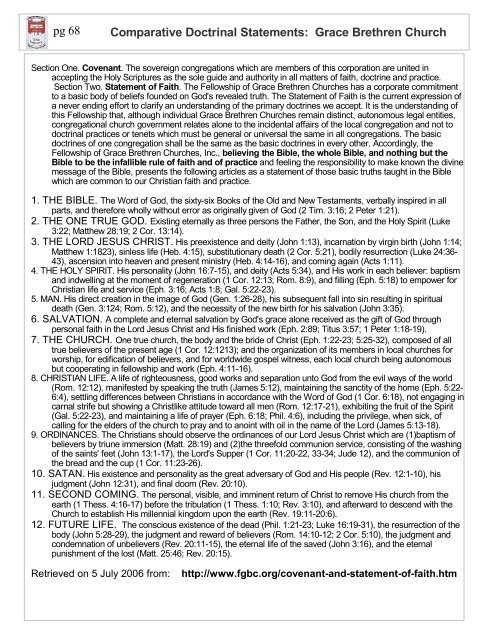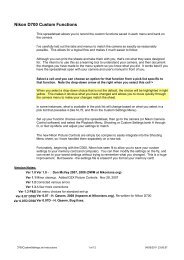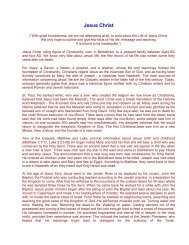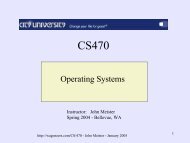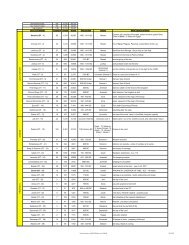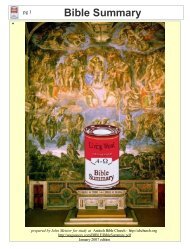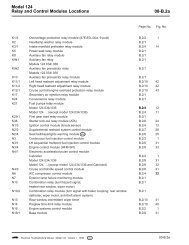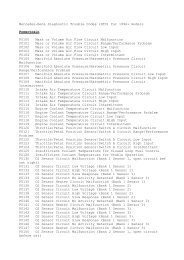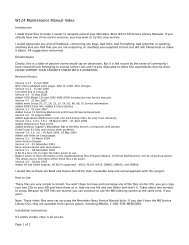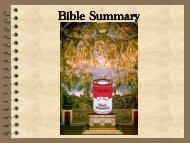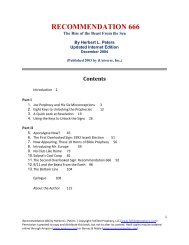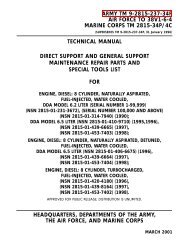Create successful ePaper yourself
Turn your PDF publications into a flip-book with our unique Google optimized e-Paper software.
pg 68 Comparative Doctrinal Statements: Grace Brethren Church<br />
Section One. Covenant. The sovereign congregations which are members of this corporation are united in<br />
accepting the Holy Scriptures as the sole guide and authority in all matters of faith, doctrine and practice.<br />
Section Two. Statement of Faith. The Fellowship of Grace Brethren Churches has a corporate commitment<br />
to a basic body of beliefs founded on God's revealed truth. The Statement of Faith is the current expression of<br />
a never ending effort to clarify an understanding of the primary doctrines we accept. It is the understanding of<br />
this Fellowship that, although individual Grace Brethren Churches remain distinct, autonomous legal entities,<br />
congregational church government relates alone to the incidental affairs of the local congregation and not to<br />
doctrinal practices or tenets which must be general or universal the same in all congregations. The basic<br />
doctrines of one congregation shall be the same as the basic doctrines in every other. Accordingly, the<br />
Fellowship of Grace Brethren Churches, Inc., believing the <strong>Bible</strong>, the whole <strong>Bible</strong>, and nothing but the<br />
<strong>Bible</strong> to be the infallible rule of faith and of practice and feeling the responsibility to make known the divine<br />
message of the <strong>Bible</strong>, presents the following articles as a statement of those basic truths taught in the <strong>Bible</strong><br />
which are common to our Christian faith and practice.<br />
1. THE BIBLE. The Word of God, the sixty-six Books of the Old and New Testaments, verbally inspired in all<br />
parts, and therefore wholly without error as originally given of God (2 Tim. 3:16; 2 Peter 1:21).<br />
2. THE ONE TRUE GOD. Existing eternally as three persons the Father, the Son, and the Holy Spirit (Luke<br />
3:22; Matthew 28:19; 2 Cor. 13:14).<br />
3. THE LORD JESUS CHRIST. His preexistence and deity (<strong>John</strong> 1:13), incarnation by virgin birth (<strong>John</strong> 1:14;<br />
Matthew 1:1823), sinless life (Heb. 4:15), substitutionary death (2 Cor. 5:21), bodily resurrection (Luke 24:36-<br />
43), ascension into heaven and present ministry (Heb. 4:14-16), and coming again (Acts 1:11).<br />
4. THE HOLY SPIRIT. His personality (<strong>John</strong> 16:7-15), and deity (Acts 5:34), and His work in each believer: baptism<br />
and indwelling at the moment of regeneration (1 Cor. 12:13; Rom. 8:9), and filling (Eph. 5:18) to empower for<br />
Christian life and service (Eph. 3:16; Acts 1:8; Gal. 5:22-23).<br />
5. MAN. His direct creation in the image of God (Gen. 1:26-28), his subsequent fall into sin resulting in spiritual<br />
death (Gen. 3:124; Rom. 5:12), and the necessity of the new birth for his salvation (<strong>John</strong> 3:35).<br />
6. SALVATION. A complete and eternal salvation by God's grace alone received as the gift of God through<br />
personal faith in the Lord Jesus Christ and His finished work (Eph. 2:89; Titus 3:57; 1 Peter 1:18-19).<br />
7. THE CHURCH. One true church, the body and the bride of Christ (Eph. 1:22-23; 5:25-32), composed of all<br />
true believers of the present age (1 Cor. 12:1213); and the organization of its members in local churches for<br />
worship, for edification of believers, and for worldwide gospel witness, each local church being autonomous<br />
but cooperating in fellowship and work (Eph. 4:11-16).<br />
8. CHRISTIAN LIFE. A life of righteousness, good works and separation unto God from the evil ways of the world<br />
(Rom. 12:12), manifested by speaking the truth (James 5:12), maintaining the sanctity of the home (Eph. 5:22-<br />
6:4), settling differences between Christians in accordance with the Word of God (1 Cor. 6:18), not engaging in<br />
carnal strife but showing a Christlike attitude toward all men (Rom. 12:17-21), exhibiting the fruit of the Spirit<br />
(Gal. 5:22-23), and maintaining a life of prayer (Eph. 6:18; Phil. 4:6), including the privilege, when sick, of<br />
calling for the elders of the church to pray and to anoint with oil in the name of the Lord (James 5:13-18).<br />
9. ORDINANCES. The Christians should observe the ordinances of our Lord Jesus Christ which are (1)baptism of<br />
believers by triune immersion (Matt. 28:19) and (2)the threefold communion service, consisting of the washing<br />
of the saints' feet (<strong>John</strong> 13:1-17), the Lord's Supper (1 Cor. 11:20-22, 33-34; Jude 12), and the communion of<br />
the bread and the cup (1 Cor. 11:23-26).<br />
10. SATAN. His existence and personality as the great adversary of God and His people (Rev. 12:1-10), his<br />
judgment (<strong>John</strong> 12:31), and final doom (Rev. 20:10).<br />
11. SECOND COMING. The personal, visible, and imminent return of Christ to remove His church from the<br />
earth (1 Thess. 4:16-17) before the tribulation (1 Thess. 1:10; Rev. 3:10), and afterward to descend with the<br />
Church to establish His millennial kingdom upon the earth (Rev. 19:11-20:6).<br />
12. FUTURE LIFE. The conscious existence of the dead (Phil. 1:21-23; Luke 16:19-31), the resurrection of the<br />
body (<strong>John</strong> 5:28-29), the judgment and reward of believers (Rom. 14:10-12; 2 Cor. 5:10), the judgment and<br />
condemnation of unbelievers (Rev. 20:11-15), the eternal life of the saved (<strong>John</strong> 3:16), and the eternal<br />
punishment of the lost (Matt. 25:46; Rev. 20:15).<br />
Retrieved on 5 July 2006 from: http://www.fgbc.org/covenant-and-statement-of-faith.htm


